新视野大学英语第三版第三册第四单元-SectionB-Traveling solo—A blessing overall!
新视野大学英语第三版读写教程第三册Unit4BTraveling
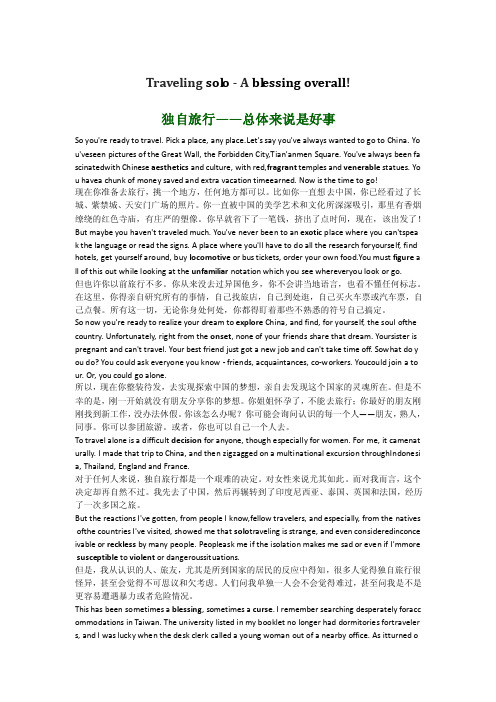
Traveling sol o - A bl essing overall!独自旅行——总体来说是好事So you're ready to travel. Pick a place, any place.Let's say you've always wanted to go to China. Yo u'veseen pictures of the Great Wall, the Forbidden City,Tian'anmen Square. You've always been fa scinatedwith Chinese aesthetics and culture, with red,fragrant temples and venerable statues. Yo u havea chunk of money saved and extra vacation timeearned. Now is the time to go!现在你准备去旅行,挑一个地方,任何地方都可以。
比如你一直想去中国,你已经看过了长城、紫禁城、天安门广场的照片。
你一直被中国的美学艺术和文化所深深吸引,那里有香烟缭绕的红色寺庙,有庄严的塑像。
你早就省下了一笔钱,挤出了点时间,现在,该出发了!But maybe you haven't traveled much. You've never been to an exotic place where you can'tspea k the language or read the signs. A place where you'll have to do all the research foryourself, find hotels, get yourself around, buy locomotive or bus tickets, order your own food.You must figure a ll of this out while looking at the unfamiliar notation which you see whereveryou look or go.但也许你以前旅行不多。
新视野大学英语第三版读写教程3Unit 4课文

Unit 4Text A The surprising purpose of travel1 It's 4:15 in the morning, and my alarm clock has just stolen away a lovely dream. I almost return back to sleep before my eye catches my packed suitcase and I groan, remembering that I'm going to the airport. The taxi is late and then lost, and I'm getting increasingly nervous that I'll miss my flight.I run in when we arrive, stagger through security and finally get to my gate. After all the trouble of this morning, my flight is canceled and I'm stuck in this terminal for the next 218 minutes, and my only consolation is a cup of complimentary airport coffee. This is traveling, a burdensome series of running and waiting, and after countless hours, finally getting there.2 Why do we travel? I don't mind the actual flying, the wonder of being airborne in a dense metal bird. The rest of the journey, however, can feel like a tedious lesson in the ills of modernity, from the predawn x-ray screening to the sad airport malls selling clusters of keepsakes. It's the result of a globalized world, and it sucks.3 Sometimes, of course, we travel because we need to. Because in this digital age, there is still something important about the handshake at a business luncheon. Or eating mom's special food on Thanksgiving. Or seeing your girlfriend on your 2-year anniversary.4 But most travel is decidedly optional. Only corporate travel, about 30% of trips over 50 miles, is truly compulsory. Instead, we travel because we want to, because the annoyances of the airport are offset by the thrill of being someplace new. Because work is stressful and our blood pressure is too high and we need a vacation somewhere tropical. Because home is boring. Because the flights are on sale. Because Paris is Paris.5 Thanks to modern aviation, we can now move through space at an inhuman speed. For the first time in human history, we can outrun the sun and move from one hemisphere to another in a single day. Of course, it's not enough to simply get on a plane. If we want to realize the creative benefits of travel, then we have to re-think its overall purpose. Most people, after all, escape to Paris so they don't have to think about those troubles they left behind. But here's the irony: Our mind is most likely to solve our most stubborn problems while we are sitting in luxury in a Left Bank café. So, instead of contemplating that buttery dessert, we should be conscious of those domestic issues we just can't solve.6 The larger lesson, though, is that our thoughts are saturated with the familiar. The brain is a space of near infinite possibility, which means that it spends a lot of time and energy choosing what not to notice. As a result, creativity is traded away for efficiency; we think in finite, literal prose, not symbolic verse. A bit of distance, however, helps loosen the cognitive chains that imprison us, making it easier to mingle the new with the old; the mundane is grasped from a slightly more abstract perspective. According to research, the experience of an exotic culture endows us with a valuable open-mindedness, making it easier to realize that even a trivial thing can have multiple meanings. Consider the act of leaving food on the plate: In China, this is often seen as a compliment, a signal that the host has provided enough to eat. But in America the same act is a subtle insult, an7 Such multicultural contrasts mean that seasoned travelers are open to ambiguity, willing to realize that there are decidedly different (and equally valid) ways of interpreting the world. This, in turn, allows them to expand the circumference of their "cognitive inputs" as they refuse to settle for their first answers and initial guesses.8 Of course, this mental flexibility doesn't come from mere distance, a simple change in latitude and longitude. Instead, this renaissance of creativity appears to be a side effect of difference: We need to change cultures, to experience the disorienting diversity of human traditions. The same facets of foreign travel that are so confusing (Do I tip the waiter? Where is this train taking me?) turn out to have a lasting impact, making us more creative because we're less insular. We're reminded of all that we don't know, which is nearly everything; we're surprised by the constant stream of surprises. Even in this globalized age, we can still be amazed at all the earthly things that weren't included in the Let's Go guidebook and that certainly don't exist back home.9 So, let's not pretend that travel doesn't have its drawbacks, or that we endure jet lag for pleasure. We don't spend 10 hours lost in the Louvre because we like it, and the view from the top of Machu Picchu probably doesn't make up for the trouble of lost luggage. (More often than not, I need a vacation after my vacation.) We travel because we need to, because distance and difference are the secret cornerstones of creativity. When we get home, home is still the same. But something in our mind has been changed, and that changes everything.Unit 4Text B Traveling solo — A blessing overall!1 So you're ready to travel. Pick a place, any place. Let's say you've always wanted to go to China. You've seen pictures of the Great Wall, the Forbidden City, Tian'anmen Square. You've always been fascinated with Chinese aesthetics and culture, with red, fragrant temples and venerable statues. You have a chunk of money saved and extra vacation time earned. Now is the time to go!2 But maybe you haven't traveled much. You've never been to an exotic place where you can't speak the language or read the signs. A place where you'll have to do all the research for yourself, find hotels, get yourself around, buy locomotive or bus tickets, order your own food. You must figure all of this out while looking at the unfamiliar notation which you see wherever you look or go.3 So now you're ready to realize your dream to explore China, and find, for yourself, the soul of the country. Unfortunately, right from the onset, none of your friends share that dream. Your sister is pregnant and can't travel. Your best friend just got a new job and can't take time off. So what do you do? You could ask everyone you know — friends, acquaintances, co-workers. You could join a tour. Or, you could go alone.4 To travel alone is a difficult decision for anyone, though especially for women. For me, it came naturally. I made that trip to China, and then zigzagged on a multinational excursion through Indonesia, Thailand, England and France.5 But the reactions I've gotten, from people I know, fellow travelers, and especially, from the natives of the countries I've visited, showed me that solo traveling is strange, and even considered inconceivable or reckless by many people. People ask me if the isolation makes me sad or even if I'm more susceptible to violent or dangerous situations.6 This has been sometimes a blessing, sometimes a curse. I remember searching desperately for accommodations in Taiwan. The university listed in my booklet no longer had dormitories for travelers, and I was lucky when the desk clerk called a young woman out of a nearby office. As it turned out, she was offering to let me stay at her flat and even had a friend come show me around the city the next day.7 Also in Taiwan, I met two girls who smuggled me into their hotel room, gave me one of the beds (they shared the other), and took me to a feast with their tour group. When they heard my next stop was their hometown, they arranged for a bilingual friend to pick me up at the train station.8 But there has also been the downside of those not-so-pleasant experiences. In Indonesia, a cute boy gave me a ride on his motorbike, and thought that gave him license to grope me illicitly. Many times in Indonesia, boys menaced me, assuming I was willing to pay for their company. In Japan, I was picked up by a young man who refused to drop me at my Youth Hostel; he insisted I stay with his friends. The friends turned out to be four girls; I was safe, but one snored like a lawnmower, and it took me two days to escape.9 I've been irritated and perplexed many times — not speaking a language, not understanding or being understood. Once, in Italy, a hotel clerk tried to overcharge me and only gave up after 10 minutes of arguing. Another time in China, a taxi driver insisted I pay more, and I was rescued by the doorman of a fancy hotel.10 Having a companion might have helped safeguard me from some of those problems. But it would have suppressed other opportunities — a long afternoon in Thailand all alone in the back of a hay wagon and then seven days in the back of a truck with a Brit, two Aussies and two Norwegians! Eating ethnic food on my way through eastern Korea with four youthful Japanese salarymen. Getting sick in China, and being nursed with chocolate bars and tissues by a couple from Texas.11 The few times I have traveled with a companion, I haven't had the same ample opportunities to meet people. Other travelers can swap stories with you about the local folklore of the places they've been to and often have credible insights into the place you're visiting. Locals are also more likely to see you as approachable and be upfront with you when you're on your own.12 Of course you have to be careful not to endanger yourself by throwing caution to the wind. Watch your back, but don't presume the worst and be overly fearful. Be friendly with people, but watch out for those who are too friendly with you. Don't disregard your instincts. If you hear stories about criminals on a road, take the road – just don't take much cash, and don't accept Coca Cola from strangers.13 The key to solo travel is to open your mind, close your eyes and leap in! Everything that happens to you is an experience, and good, bad or neutral, they will all benefit you in some way. Take those little annoyances, those inefficiencies, and those boring bureaucrats with a laugh. If you despise something, just remember: You don't live there, you can leave anytime, and you'll never have to deal with this again!14 Don't ever let a lack of companionship constrain you from doing what you really want to do. Once you go solo, you'll be amazed at how sensational your travel experiences will be.。
新视野大学英语第三版读写教程第三册Units1-4课文翻译
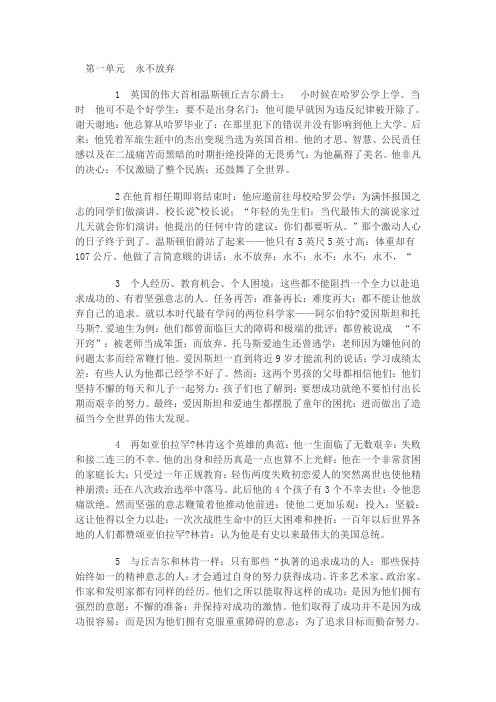
第一单元永不放弃1 英国的伟大首相温斯顿丘吉尔爵士:小时候在哈罗公学上学。
当时他可不是个好学生:要不是出身名门:他可能早就因为违反纪律被开除了。
谢天谢地:他总算从哈罗毕业了:在那里犯下的错误并没有影响到他上大学。
后来:他凭着军旅生涯中的杰出变现当选为英国首相。
他的才思、智慧、公民责任感以及在二战痛苦而黑暗的时期拒绝投降的无畏勇气:为他赢得了美名。
他非凡的决心:不仅激励了整个民族:还鼓舞了全世界。
2在他首相任期即将结束时:他应邀前往母校哈罗公学:为满怀报国之志的同学们做演讲。
校长说~校长说;“年轻的先生们:当代最伟大的演说家过几天就会你们演讲:他提出的任何中肯的建议:你们都要听从。
”那个激动人心的日子终于到了。
温斯顿伯爵站了起来——他只有5英尺5英寸高:体重却有107公斤。
他做了言简意赅的讲话:永不放弃:永不:永不:永不:永不,“3 个人经历、教育机会、个人困境:这些都不能阻挡一个全力以赴追求成功的、有着坚强意志的人。
任务再苦:准备再长:难度再大:都不能让他放弃自己的追求。
就以本时代最有学问的两位科学家——阿尔伯特?爱因斯坦和托马斯?.爱迪生为例:他们都曾面临巨大的障碍和极端的批评:都曾被说成“不开窍”:被老师当成笨蛋:而放弃。
托马斯爱迪生还曾逃学:老师因为嫌他问的问题太多而经常鞭打他。
爱因斯坦一直到将近9岁才能流利的说话:学习成绩太差:有些人认为他都已经学不好了。
然而:这两个男孩的父母都相信他们:他们坚持不懈的每天和儿子一起努力:孩子们也了解到:要想成功就绝不要怕付出长期而艰辛的努力。
最终:爱因斯坦和爱迪生都摆脱了童年的困扰:进而做出了造福当今全世界的伟大发现。
4 再如亚伯拉罕?林肯这个英雄的典范:他一生面临了无数艰辛:失败和接二连三的不幸。
他的出身和经历真是一点也算不上光鲜:他在一个非常贫困的家庭长大:只受过一年正规教育:轻伤两度失败初恋爱人的突然离世也使他精神崩溃:还在八次政治选举中落马。
此后他的4个孩子有3个不幸去世:令他悲痛欲绝。
新视野大学英语第三版读写教程第三册UNIT4课文及翻译(A+B篇)
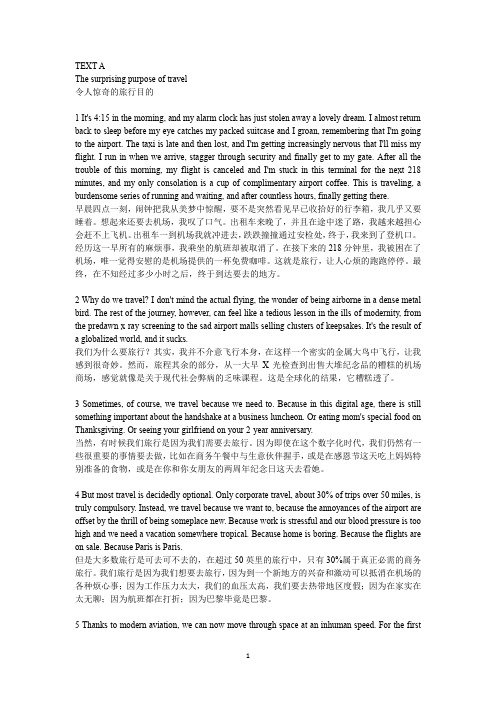
TEXT AThe surprising purpose of travel令人惊奇的旅行目的1 It's 4:15 in the morning, and my alarm clock has just stolen away a lovely dream. I almost return back to sleep before my eye catches my packed suitcase and I groan, remembering that I'm going to the airport. The taxi is late and then lost, and I'm getting increasingly nervous that I'll miss my flight. I run in when we arrive, stagger through security and finally get to my gate. After all the trouble of this morning, my flight is canceled and I'm stuck in this terminal for the next 218 minutes, and my only consolation is a cup of complimentary airport coffee. This is traveling, a burdensome series of running and waiting, and after countless hours, finally getting there.早晨四点一刻,闹钟把我从美梦中惊醒,要不是突然看见早已收拾好的行李箱,我几乎又要睡着。
想起来还要去机场,我叹了口气。
出租车来晚了,并且在途中迷了路,我越来越担心会赶不上飞机。
新视野大学英语第三册第四单元

Five Famous Symbols of American CultureI. ObjectivesII. PreviewIII. leading-inIV. Section A-TextV. Answers to Exercises VI. Extensive Tasks VII. Testing Yourself VIII. HomeworkNHCE-BIII-Unit 4 I: ObjectivesMENU •Objectives•Students would:• 1. be able to successfully finish listening, speaking, reading and writing tasks related to the theme of ―symbols of American culture‖, with the help of theme vocabulary.• 2. improve the accuracy of their spoken and written output, thanks to theme words and expressions.• 3. improve the fluency of their spoken output during the completion of the chains of tasks.•4. have an understanding about the essence of American and Chinese culture.1. About American Culture:Most Americans see themselves first as individuals and then as a member of a community, family or other groups. Some people from other countries view this as being ―selfish‖. Others view it as freedom from constraints.IndividualismThe main content of American culture is the emphasis on individuals' value, the pursuit of democracy and freedom, the promotion of deploitation (开拓, 经营), competition, and the need of realism and practicality.Equality and InformalityMost Americans treat each other in informal ways, even in the presence of great differences in age or social standing. Some see this as a ―lack of respect‖. Others see it as a healthy lack of concern for social ritual (礼仪).2.A Poem Inscribed on the Statue of LibertyThe New Colossusby Emma Lazarus Not like the brazen giant of Greek fame,With conquering limbs astride from land to land;Here at our sea-washed, sunset gates shall standA mighty woman with a torch, whose flameIs the imprisoned lightning, and her nameMother of Exiles. From her beacon-handGlows world-wide welcome; her mild eyes commandThe air-bridged harbor that twin cities frame."Keep ancient lands, your storied pomp!" cries sheWith silent lips. "Give me your tired, your poor,Your huddled masses yearning to breathe free,The wretched refuse of your teeming shore.Send these, the homeless, tempest-tost to me,I lift my lamp beside the golden door!"新的巨人(New Colossus)不像那无耻的古希腊的青铜巨人,叉腿横跨征服的陆地;在这海水冲洗的日落重门,将矗立起一位手持火炬的伟大女性,火焰是被囚禁着的闪电,流放者们的母亲就是她的姓名。
新视野大学英语第三版读写教程第三册UNIT4课文及翻译(A+B篇)

TEXT AThe surprising purpose of travel令人惊奇的旅行目的1 It's 4:15 in the morning, and my alarm clock has just stolen away a lovely dream. I almost return back to sleep before my eye catches my packed suitcase and I groan, remembering that I'm going to the airport. The taxi is late and then lost, and I'm getting increasingly nervous that I'll miss my flight. I run in when we arrive, stagger through security and finally get to my gate. After all the trouble of this morning, my flight is canceled and I'm stuck in this terminal for the next 218 minutes, and my only consolation is a cup of complimentary airport coffee. This is traveling, a burdensome series of running and waiting, and after countless hours, finally getting there.早晨四点一刻,闹钟把我从美梦中惊醒,要不是突然看见早已收拾好的行李箱,我几乎又要睡着。
想起来还要去机场,我叹了口气。
出租车来晚了,并且在途中迷了路,我越来越担心会赶不上飞机。
新视野大学英语第三版第三册第四单元-Section-Bppt课件
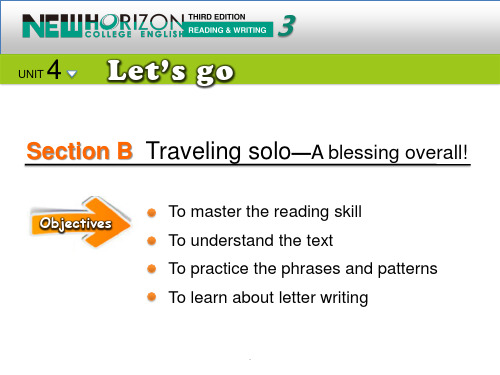
2. What did the young Chinese man do?
Tips
The young Chinese man cycled alone around Europe, with just a bike and a frisbee equipped. He took the paths from mountains to forests, from rugged roads to creeks. The journey was often strenuous with a new challenge waiting at every turn.
Tips A building that provides cheap and simple
accommodations and meals especially to young people who are traveling.
.
2. What do Youth Hostels provide?
.
B Section Tr ave l i n g s o l o — A b l e s s i n g ove r a l l !
Contents
Warming-up Reading Skills Text Study Comparative Study Unit Project
.
B Section Tr ave l i n g s o l o — A b l e s s i n g ove r a l l !
.
3. How has he benefited from the experience?
Tips
The solo travel has made a difference in his life. He didn't even know how to fix a bike before he started his tour. He set out on his journey armed with his passion for sports and his taste for a challenge but as he finished his trek, he discovered something much deeper. He reckons that to be oneself is important and his trip is doing what he loves. He hopes to inspire those like him to start living out their dreams.
新视野大学英语第三版第三册Unit4教案
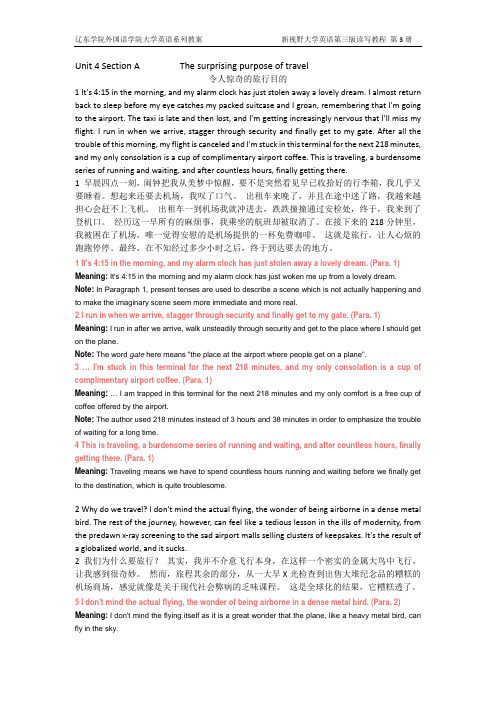
Unit 4 Section A The surprising purpose of travel令人惊奇的旅行目的1 It's 4:15 in the morning, and my alarm clock has just stolen away a lovely dream. I almost return back to sleep before my eye catches my packed suitcase and I groan, remembering that I'm going to the airport. The taxi is late and then lost, and I'm getting increasingly nervous that I'll miss my flight. I run in when we arrive, stagger through security and finally get to my gate. After all the trouble of this morning, my flight is canceled and I'm stuck in this terminal for the next 218 minutes, and my only consolation is a cup of complimentary airport coffee. This is traveling, a burdensome series of running and waiting, and after countless hours, finally getting there.1 早晨四点一刻,闹钟把我从美梦中惊醒,要不是突然看见早已收拾好的行李箱,我几乎又要睡着。
想起来还要去机场,我叹了口气。
- 1、下载文档前请自行甄别文档内容的完整性,平台不提供额外的编辑、内容补充、找答案等附加服务。
- 2、"仅部分预览"的文档,不可在线预览部分如存在完整性等问题,可反馈申请退款(可完整预览的文档不适用该条件!)。
- 3、如文档侵犯您的权益,请联系客服反馈,我们会尽快为您处理(人工客服工作时间:9:00-18:30)。
2. What did the young Chinese man do?
Tips
The young Chinese man cycled alone around Europe, with just a bike and a frisbee equipped. He took the paths from mountains to forests, from rugged roads to creeks. The journey was often strenuous with a new challenge waiting at every turn.
Tips A building that provides cheap and simple accommodations and meals especially to young people who are traveling.
2. What do Youth Hostels provide?
Tips Youth Hostels provide budget-oriented,
sociable accommodation where guests can rent
a bed, usually a bunk bed, in a dormitory and share a bathroom, lounge and sometimes a kitchen. Rooms can be mixed or single-sex, although private rooms may also be available.
3. How has he benefited from the experience?
Tips
The solo travel has made a difference in his life. He didn't even know how to fix a bike before he started his tour. He set out on his journey armed with his passion for sports and his taste for a challenge but as he finished his trek, he discovered something much deeper. He reckons that to be oneself is important and his trip is doing what he loves. He hopes to inspire those like him to start living out their dreams.
3. What are the differences between Youth Hostels and hotels?
Tips
Compared with hotels, youth Hostels tend to be budget-oriented; rates are considerably lower, and many hostels have long-term residents whom they employ as desk clerks or housekeeping staff in exchange for free accommodations. They offer an informal environment and more common areas and opportunities for travelers to socialize.
Warming-up
Lead-in
Background Information
1. What do many people dream of according to the
video clip?
2. What did the young Chinese man do?
Tips
Tips
3. How has he benefited from the experience?
3
UNIT
4
Let’s go
Section B Traveling solo—A blessing overall!
Objectives
To master the reading skill To understand the text To practice the phrases and patterns To learn about letter writing
Section
B
Trave l i n g s o l o — A b l e s s i n g ove ra l l !
Contents
Warming-up ReadinΒιβλιοθήκη Skills Text Study
Comparative Study
Unit Project
Section
B
Trave l i n g s o l o — A b l e s s i n g ove ra l l !
Tips
Video Watching
Back
1. What do many people dream of according to the video clip?
Tips
Many people dream of leaving everything behind
to set off on an adventure that will take them to distant and exotic lands.
Section
1. What is Youth Hostel?
Tips
2 . What do Youth Hostels provide?
Tips
3. What are the differences between Youth Hostels and hotels?
Tips
1. What is Youth Hostel?
